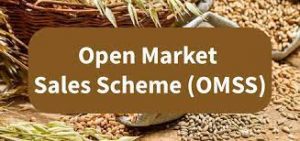Open Market Sale Scheme For Wheat And Rice:

In response to the Food Corporation of India’s (FCI) imposition of quantity restrictions and denial of states’ participation in the Open Market Sale Scheme (OMSS), states have been exploring alternative methods to procure wheat and rice.
- Open Market Sale Scheme is a program implemented by the FCI to facilitate the sale of surplus food grains, primarily wheat, and rice, from the central pool in the open market.
Revised OMSS Restrictions:
- The OMSS underwent a recent revision with a focus on limiting the quantity that a single bidder can purchase in a single bid.
- Previously, the maximum allowed quantity per bid was 3,000 metric tonnes. However, it has now been reduced to a range of 10-100 metric tonnes.
- The aim of this change is to promote wider participation by accommodating small and marginal buyers.
- By encouraging competitive bids from smaller buyers, the revised OMSS seeks to curb retail prices and create a more level playing field.
- Purpose and Objectives:
- Enhance food grain supply during lean seasons.
- Moderate open market prices and control inflation.
- Ensure food security and availability of grains in deficit regions.
- Facilitate the sale of surplus food grains from the central pool.
- Implementation and Process:
- Conduct e-auctions by the FCI for traders, bulk consumers, and retail chains to purchase specified quantities of food grains at pre-determined prices.
- Allow states to procure additional food grains through OMSS for distribution under the National Food Security Act,2013 (NFSA).
- FCI conducts weekly auctions for the OMSS for wheat on the platform of the National Commodity and Derivatives Exchange Limited (NCDEX).
- NCDEX is a commodity exchange platform in India that provides a platform for trading in various agricultural and other commodities.




